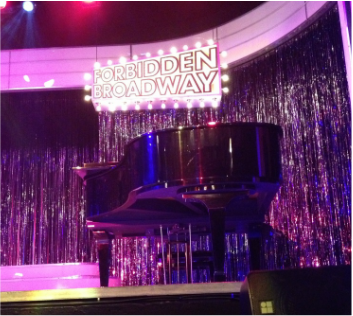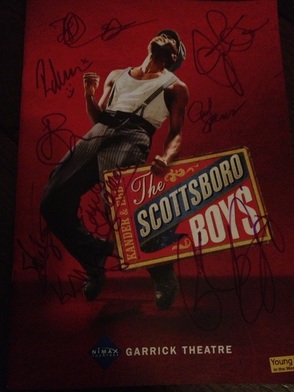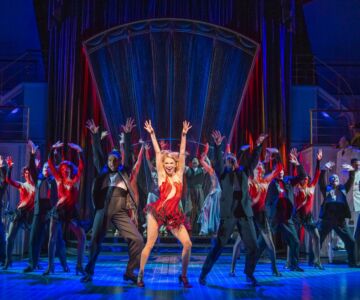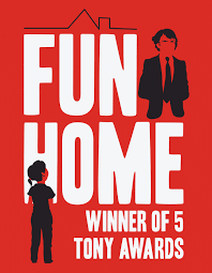 "Forbidden Broadway" Just As Funny In Londonby Randi / November 23, 2014
"Forbidden Broadway" Just As Funny In Londonby Randi / November 23, 2014 “The Scottsboro Boys” really does present all of this and much more, in a gut-wrenching, unnerving portrayal of the heart-breaking true story. Actually, it doesn’t have one of the above-listed items: rape. “The Scottsboro Boys” tells the true and depressing story about 9 young black men and boys who were falsely accused of rape in 1931, by two white “Alabama ladies” who were trying to get out of being caught themselves for sneaking onto a train. In our modern society (which is pretty much the same on this issue as it has been throughout history because nothing has improved, really), it’s hard to latch on to the subject of women lying about sexual assault, since that happens only maybe 0.03% of the time yet is argued to be the case 100% of the time.
Sounds like a perfect idea for a musical, right? Well it is. There’s a stupid stereotype about Broadway musicals out there, that they are pretty much live Disney princess movies where everything is happy and the music comes from people breaking into song due to happiness. People who think this way have probably not seen a musical in a theatre in the past 40 years or so. The majority of great musicals tell complicated stories. The format enhances storytelling of all sorts because, as no one could deny, music has the ability to convey all kinds of emotions and thoughts better than merely speaking can. “The Scottsboro Boys” works as a musical because we think it shouldn’t. The creative team (including music by Kander & Ebb) took this awful, depressing story of our actual history and made a musical version one would never expect: a minstrel show. In this manner, the story becomes even more grotesque and upsetting. The framing device, of a group of black actors telling this tale with high-stepping songs and big smiles (at least in the beginning), lets the audience see even more clearly how disgusting not just this story but all of America’s racist history (and present) is. Some of the songs done in the minstrel fashion are supposed to make you smile and then make you shudder in horror at the fact that you just smiled.
The show is difficult to get through at times, but it’s so worth it. We’ve heard endless awful stories coming out of this time period, but this one really hits you and hurts, due to how familiar and close we get with the characters. The talent on that stage is impressive, and nearly half the actors come from the original Broadway cast. I did not know this going in, because I am a Broadway snob and I assumed that if people I should know were over here, then I’d know it. I am a fool. A fool! The two main minstrels, Mr. Bones and Mr. Tambo, are played by Colman Domingo and Forrest McClendon. BOTH from the original Broadway cast, BOTH were nominated for featured actor Tony awards. I mean. I just had a momentary slip I guess. I was almost surprised to realize that McClendon was playing Mr. Tambo because his accent was sooo weird, so off-putting. I blamed it on the difficulty I’ve seen too much over here, of British actors butchering an American accent, then taken 4 steps further to make it Southern and comical. But he’s American. I guess it just works for the character but I wanted him to stop! The other original cast member was one of my faves – James T. Lane (who is from Philly and is my new friend), who does double duty as one of the boys and as one of the accusers, along with English actor Dex Lee. Even the White Man (or the Interlocutor), sort of running the minstrel show, is played by Julian Glover. Like, huge British actor that some people in the audience came specifically to see. I had no idea.
The main character is Haywood Patterson, a deep, illiterate, and pessimistic young man who based his life on always telling the truth, an ironic commitment here when telling the truth begets further punishment. While he’s sadly not portrayed by (the awesome and superb) Joshua Henry, the original Broadway cast member who was nominated for a Tony, he’s played by Brandon Victor Dixon, who originated the role off-Broadway and who is actually the one on the recording. (Side note: the off-Broadway company got a recording, so it wasn’t deemed necessary for the Broadway production. But now the London cast is getting a recording! Meaning, it’s pretty much the same people now because of Dixon in the lead again…conclusion, poor Joshua Henry.) Dixon was in “Motown: The Musical” last year and was nominated for “The Color Purple” back with ‘Tasia so he’s prettayyyy great. I just don’t know how I missed all this coming in.
We watch Haywood become a natural leader of this group of strangers, who eventually become more like brothers. We watch as one of the other boys teaches Haywood how to read and write. (This scene could have been more touching, but it was written extremely oddly – mostly about boobs and which letters look like them (spoiler: all of them?). It was very out of place.) Haywood is the character you most connect with and feel for, as his vow to uphold truth backfires in this corrupt judicial system, as he loses the chance to see his mother one last time, as he becomes the last one in prison.
I didn’t really just spoil it, saying that the others eventually get out of prison. There’s no happy ending, and it still takes many, many years before the youngest are first freed. As we learn in a sort of epilogue, freedom doesn’t do much, as their lives have already been destroyed. Most take their own lives, actively or passively letting themselves wither away instead of dealing with the world that knowingly did this to them. Haywood, who could have gotten paroled if he lied and admitted the crime, would never abandon his morals and instead died in jail. Yeah it’s a terrible damn story but it’s important to see. At times I actually had flashes of the thought “damn, I wish courts today paid half as much attention to sexual assault cases.” But the court didn’t give a damn about the supposed victims, or they would have actually listened to them when they recanted their false accusations. They just wanted to punish black people. That’s seriously what happened, and not that long ago either. It’s terrifying, and sad, and somehow the musical context enhances its poignancy. At the end, we learn from a movie-style written credit that the governor of Alabama officially pardoned the boys in 2013. Because the musical called attention to his state’s shitty history, not to pardon all the thousands of innocent black people who were and are victimized in similar ways. At least this story, when told in this very effective fashion, can elucidate the struggle that is still occurring. In that way, it’s a must-see.






